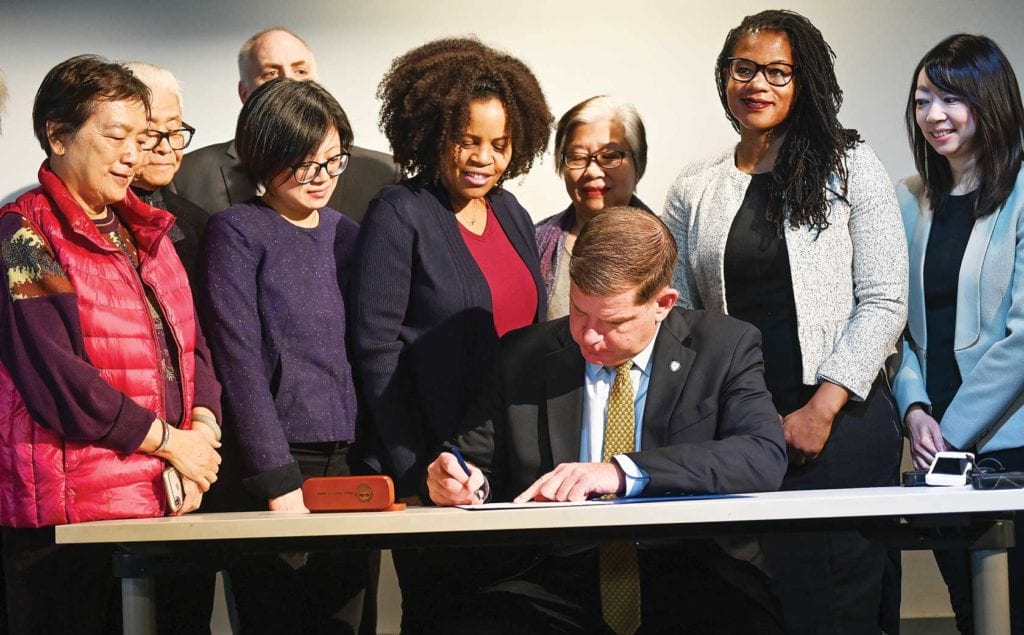Mayor signs off on real estate transfer fee
Fee would apply to sales over $2 million, fund affordable units

Surrounded by affordable housing activists and city councilors, Mayor Martin Walsh on Monday signed an ordinance authorizing the city impose a fee real estate sales valued at $2 million or more at a rate of up to 2 percent.
The tax, championed by City Councilors Lydia Edwards, Edward Flynn and Kim Janey, is expected to raise more than $160 million a year, funds that would be applied to the city’s Neighborhood Housing Trust for the construction of affordable units. The new fee would be split evenly between the property’s seller and the purchaser.
Walsh said the funding is needed to help keep working-class and middle-class people in the city.
“Housing is the biggest economic challenge for the residents of Boston and across the region,” he said.
The measure passed in the city council last week over the no votes of councilors Mark Ciommo, Frank Baker and Althea Garrison. Next, it will go to the State House as a home rule petition. If approved by the House and Senate, the bill will be signed into law.
But passage in the State House is no sure thing.
“It will take all of us working very hard together to get this passed at the State House,” said Sheila Dillon, Boston’s Department of Neighborhood Development director.
Edwards noted that Boston is one of 38 municipalities petitioning the Legislature for changes in the way housing is built and taxed in their communities.
“We’re asking for permission for Boston to be as bold as it can be,” she said.
Edwards’ first version of the bill called for a 6 percent tax on real estate transfers and included a tax on properties that are “flipped” — bought and then quickly re-sold, often with minimal improvements. Edwards, her fellow councilors and Walsh ironed out compromises on the bill.
Monday, Edwards said the legislation was aimed at bringing equity to the city’s real estate market, where most housing units cost more than what most current city residents can afford.
While 20 percent of the new housing units built in Boston over the last six years have been affordable rentals or deed-restricted owner-occupied units, the waitlists for such units are long. Janey noted that at a recently-completed 76-unit development in Roxbury, the waiting list was over 4,000 people.
“I ran for office because people were being left out of the economic prosperity in this city and literally being pushed out of their neighborhoods,” she said. “We know we have to come up with solutions.”
Asian Community Development Corporation Executive Director Angie Liou said a similar development in Chinatown received 4,400 applications for 146 affordable units.
“That means we were able to accept 3 percent of people who applied,” she said. “It’s harder to get into that housing than it is to get into Harvard. We just can’t add new housing fast enough. It’s actually an existential threat to neighborhoods like Chinatown.”
Walsh said the long lists for affordable units include many families from outside Boston.
“This is a statewide problem,” he said. “We’re one of the only cities in the Northeast that’s addressing this problem. If other cities and towns don’t handle this, it’s going to continue to get worse.”







